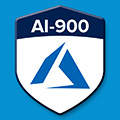
Duration: 1 Day
After completing this course, students will be able to:
Module 1: Describe Artificial Intelligence Workloads and Considerations
Module 2: Describe Fundamental Principles of Machine Learning on Azure
Module 3: Describe Features of Computer Vision Workloads on Azure
Module 4: Describe Features of Conversational AI Workloads on Azure
A Certified Microsoft Azure Trainer
£599+VAT
Clientele ➞























Our Partners




